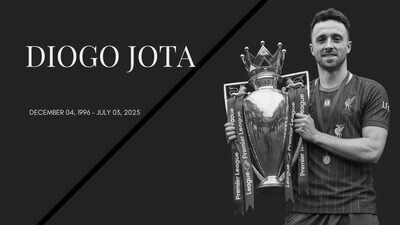ARTICLE AD BOX

Liverpool’s Premier League triumph in the 2024-25 season – viewed today with the clarity of hindsight and Arsenal’s late collapse – might seem like it was written in the stars. But back on December 14, it felt anything but certain.
Down to ten men after Andy Robertson’s red card and trailing Fulham 1-0 at Anfield, Arne Slot’s men looked destined for defeat. Yet Liverpool refused to surrender. Cody Gakpo equalised, Rodrigo Muniz restored Fulham’s lead, and then Diogo Jota slalomed through defenders to slot home an 86th minute leveller that Anfield celebrated like a title-winning goal.Now, as Liverpool fans still revel in their 20th league crown – a season in which Jota’s goals proved decisive – the world wakes to news that feels unbearably cruel.
Diogo Jota is dead. The forward who lifted the Premier League, FA Cup, League Cup, and Community Shield with Liverpool; who scored for Portugal in Euros and World Cup qualifiers; who won hearts from Gondomar to the Kop – is gone, at just 28. Like the Busby Babes before him, a champion has fallen at his peak, leaving behind only memories, medals, and mourning.
Liverpool Star Diogo Jota Dies At 28 In Horrific Car Crash Just 2 Weeks After Wedding
From Gondomar’s Streets to Anfield’s Lights
Diogo Jota’s story began in modest surroundings. Born in Gondomar near Porto, the talented youngster never came through one of Portugal’s elite academies.
He spent a decade playing for little Gondomar FC – paying €20 a month just to train – before moving on. “The percentage of players who come this far is even smaller,” Jota once admitted, aware that his rise was unusual. That humble background made his ascent all the more astonishing.Arriving at Anfield in 2020, the slight 25-year-old striker needed no time to adapt. He scored seven goals in his first ten games and soon became a fan favourite.
Liverpool had splashed out £41 million for him, but the investment quickly looked astute. Jamie Carragher nicknamed him “Jota the Slotter,” and terraces erupted with a chant: “He’s a lad from Portugal, better than Figo, oh his name is Diogo!” In just a few seasons – “three years after turning out in the Championship” – “the boy from Gondomar has reached his destination” as a key man for club and country.
His journey from obscure youth leagues to Champions League hero was the stuff of dreams, and Anfield’s stands embraced him as one of their own.
Relentless, Intelligent, Deadly: Jota’s Playing Style
On the pitch, Diogo Jota combined sharp movement with a predator’s instinct in the box. He wasn’t the tallest forward, but his timing and aggression in aerial duels made him a formidable header of the ball. Off the ball, he pressed with tireless intensity, embodying the Klopp and Slot ethos of defending from the front. Technically sound with both feet, he could drop deep to link play or drive directly at defenders, unsettling backlines with his low centre of gravity and rapid changes of direction.
Crucially, Jota had the priceless striker’s trait: composure under pressure. Whether slipping a calm finish past a keeper or thundering in a header, he made goals look effortless. For Liverpool, he was not just a forward; he was a system player and a chaos creator, unlocking defences when others faltered.
Honeymoon Interrupted: Love and Loss
FIFTY Liverpool goals for Diogo Jota! | Late Spurs winner, seven vs Arsenal & iconic celebrations!
Just weeks before the end came, Jota had celebrated one of life’s happiest moments. On 22 June 2025 he married his childhood sweetheart, Rute Cardoso.
Images of the Liverpool forward beaming alongside Rute – together more than a decade and already parents of three – flooded social media. “22 de Junho de 2025. Sim, para sempre,” Rute captioned a wedding photo that brimmed with love. Teammates toasted their joy; club and nation rejoiced.
The newlywed striker even announced a third child on the way.Now all that happiness is frozen in tragedy. On the early morning of July 3, 2025, Diogo Jota and his brother died in a car crash on Spain’s A-52 near Zamora.
Their vehicle veered off the road and caught fire. There were no survivors. In the space of a heartbeat, Jota’s new bride is widowed and three young children are fatherless. A family’s future – and all the hopes attached to it – was cruelly cut short. The image of a joyous future jerked out of film and into a nightmare hangs in the air: a wedding cake still untouched, an unanswered text to Rute’s “Sim, para sempre.
” For those who knew Jota, the contrast is devastating – the player who once danced through fields of play is forever young at 28, forever frozen on the cusp of parenthood.
A Chorus of Mourning
News of Diogo Jota’s death has sent shockwaves through the football world. Fans across Liverpool, Portugal, and beyond woke up to headlines they never imagined reading. Messages of grief are pouring in from teammates, clubs, and supporters – all expressing disbelief that a player so young, so decisive, and so full of life is gone. For Liverpool fans, it is a loss that cuts deep: the forward who helped deliver their 20th league title has been taken just days after his wedding.
For Portuguese fans, it is the end of a journey that began on the streets of Gondomar and reached the grandest stages of Europe.And beyond club colours or national flags, his death has united football fans everywhere. From Mumbai to Manchester, in living rooms and offices, phones buzz with the same stunned question: how can he be gone? Because whether we supported Liverpool or not, Jota was someone we saw almost every week – celebrating goals with that broad grin, slipping away from defenders with ease, dazzling us with moments that made football magical.
Today, supporters who would never sing the same chants or wear the same shirts find themselves mourning together. Because when someone like Jota – young, brilliant, still rising – is suddenly taken, we’re reminded that behind every badge is a human being, behind every highlight reel is a life. And that, in the end, is what connects us all.To Liverpool, to Portugal, to the fans who sang his name and even those who didn’t, Diogo Jota was more than just a star – he was the boy from Gondomar who fought his way to the top. Fans who once saw only the black-and-white highlights now see shades of themselves in his story: scrappy, underpaid, endlessly hopeful. Today, wherever that story is told, one truth echoes: You’ll never walk alone.Also read | Diogo Jota Dead: What was the net worth of Liverpool star



.png)
.png)
.png)
















 6 hours ago
4
6 hours ago
4









 English (US) ·
English (US) ·